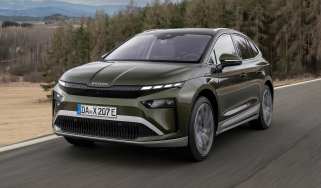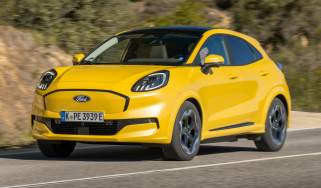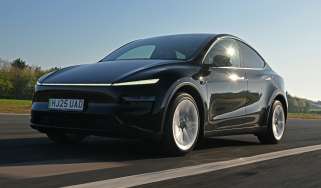Fastest-depreciating electric and hybrid cars 2024
Looking for a second hand bargain? These are the new hybrid, plug-in hybrid and electric cars that lose the most value
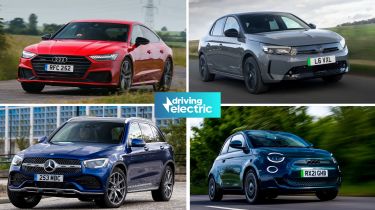
Almost every car suffers a degree of depreciation during its early life – a big chunk of value usually goes the minute they leave the showroom. Inevitably, as a car piles on the miles, the associated wear-and-tear causes the value to drop even further. But some cars depreciate more quickly than others. Demand plays the big role in this; cars that are more highly sought-after benefit from higher residual value (RV), while models the market deems less desirable or that are available in high numbers see their prices heavily depreciate.
Depreciation can even have an impact on how much you pay on a monthly PCP electric car finance deal. Expensive cars can often work out cheaper per month than a less prestigious equivalent, largely down to the fact they tend to have higher RVs. If a finance company knows the car will be worth a decent amount in the future, you can be charged less to use it during the finance agreement.
List price can also affect depreciation. More expensive models inevitably have more to lose, a £70,000 electric SUV has much further to fall than a £10,000 city car. Even if the city car is worth pennies at the end of its life it will never drop by more than a few thousand pounds.
It’s worth remembering that if you’re not fussed about driving a brand-new model, then a used car with poor RVs can represent fantastic value for money. Once the first owner has taken that initial hit, the smart buyer is left with something of a second-hand bargain.
Fastest depreciating electric cars
Here, we list the fastest-depreciating electric and hybrid cars, the percentage figures indicating how much of each model’s list price is retained after three years and 36,000 miles on the road. You can also check out our list of the slowest-depreciating cars to get an idea of those that hold their value the best.
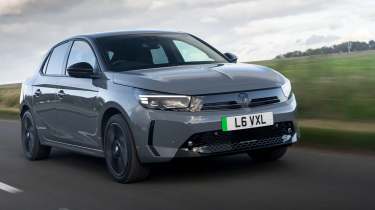
1. Vauxhall Corsa Electric (29.44%)
The Vauxhall Corsa was one of the best-selling cars in the UK in both 2022 and 2023, and while the plug-in Corsa Electric makes up a significant minority of the total sales, the British brand’s supermini still manages to squeeze onto our list of the fastest-depreciating EVs. Top-spec Ultimate models will lose you the most cash in the long run.
Read our full review of the Vauxhall Corsa Electric to find out more.
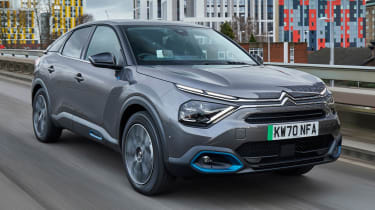
2. Citroen e-C4 (29.92%)
Sharing a powertrain with the Jeep Avenger, the Citroen e-C4 is a practical and comfortable electric family car with plenty of appeal. However, the car being predicted to lose a significant amount of value within the first few years may give you pause for thought, with the e-C4 e-Series likely to lose the most.
Read our full review of the Citroen e-C4 to find out more.
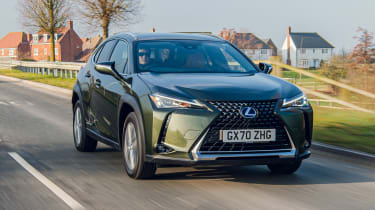
3. Lexus UX 300e (31.53%)
The Lexus UX 300e being included on this list proves that buying premium doesn’t stop depreciation. The UX 300e SUV is comfortable and enjoyable to drive with plenty of creature comforts in the cabin but despite all that’s good, it still loses a significant amount after three years, with the Takumi trim cars being the worst affected.
Read our full review of the Lexus UX 300e to find out more.
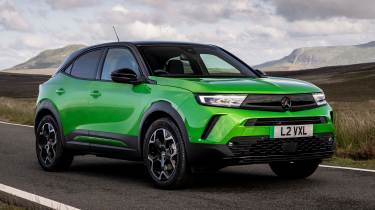
4. Vauxhall Mokka Electric (31.57%)
The Vauxhall Mokka Electric may be one of the UK's best-selling EVs, but despite its attractive styling, the Mokka Electric is not very exciting to drive and other rivals possess greater range capabilities. It would be the high specification Mokka Electric Ultimate in particular that would be worth avoiding due to the fact that it will lose the most.
Read our full review of the Vauxhall Mokka Electric to find out more.
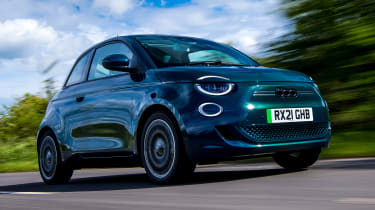
5. Fiat 500e (31.65%)
The petrol-powered Fiat 500 took the UK by storm when it was revived back in the late 2000s, and while the electric 500e model still retains a lot of the petrol car’s charm, it unfortunately also mirrors its poor ability to retain its value. The 500e with its toaster oven-sized boot is the worst offender in this regard; the electric Fiat only manages to keep 31.65% of its value over the pre-stated time period.
Read our full review of the Fiat 500e to find out more.
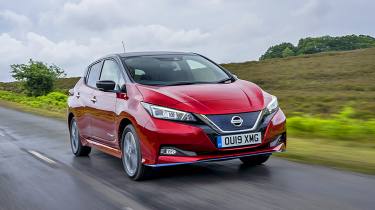
6. Nissan Leaf (31.84%)
When it was released in 2009, the Nissan Leaf became the first mass-produced electric car. We have seen a few updates since then and while it has remained affordable with a decent range, the interior has become dated and the charging times are not up to scratch against modern rivals. While those features will not help with the residual values, the sheer numbers of Leafs that Nissan has sold contribute to the fact that it is only predicted to retain 31.84 of its value, with the Acenta being the worst affected.
Read our full review of the Nissan Leaf to find out more.
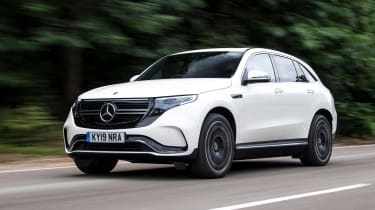
7. Mercedes Benz EQC (33.02%)
The Mercedes EQC has been around for a few years now and when it was released it was a tech filled, comfortable premium electric SUV that was a flagship model for the German brand. However, as time has gone on the interior has become somewhat dated, drawing attention to other flaws such as the handling feeling heavy and its practicality not being at the same level as some other rivals. In three years the EQC will be worth 33.02 per cent of its original value so if you're patient, you could get yourself a premium EV bargain in a few years.
Read our full review of the Mercedes Benz EQC to find out more.
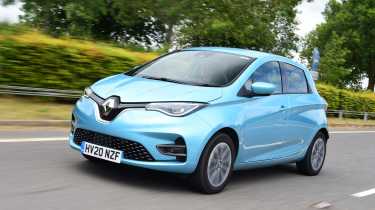
8. Renault ZOE (33.98%)
The Renault ZOE became one of the first mainstream electric cars when it debuted back in 2013. However, its popularity may have had an impact on its residuals, as the French electric supermini is only forecasted to retain 33.98% of its value. The worst performer is the Techo model with other models doing slightly better. Read our full review of the Renault ZOE to find out more.
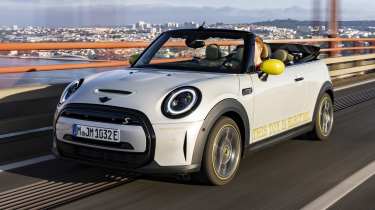
9. MINI Electric Convertible (34.63%)
MINI has always been a brand rich in charm and heritage with the MINI electric Convertible being no exception. Just like the standard MINI Electric hatch, the Convertible has immensely agile handling and fast steering, however, as the MINI lacks the extra rigidity of a solid roof, there is an increased sense of body movement while cornering. The MINI Electric Convertible comes with the largest price tag ever on a MINI and even though there will only be 999 produced worldwide including 150 for the UK, it is still expected to suffer heavy depreciation within the first three years, not helped by the arrival of the new MINI range.
Read our full review of the MINI Electric Convertible to find out more.
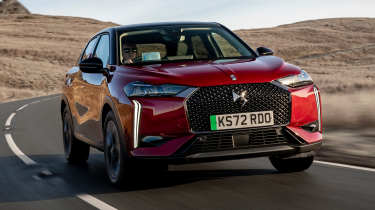
10. DS 3 E-Tense (35.54%)
The DS 3 E-Tense is in essence a more upmarket version of the Vauxhall Mokka, with luxury touches inside the cabin and a relaxing driving experience. However, the premium touches added to the car still aren’t enough to match the large price tag that DS 3 E-Tense has been given, which could be a large factor in the expected depreciation during the models first few years.
Read our full review of the DS 3 E-TENSE to find out more.
Fastest depreciating hybrid cars
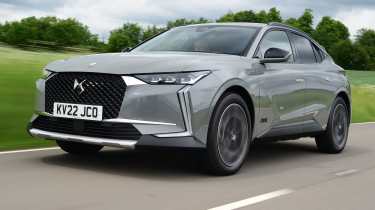
1. DS 4 E-Tense (31.8%)
The DS 4 E-Tense is the middle child in the DS range, sitting between the DS 3 and the larger DS 7. This plug-in hybrid comes with a lavish interior, plenty of tech and has a comfortable ride. Yet the DS 4 is far from perfect, the steering has a distinct lack of feel and the rear seating is far from adequate, any taller adults would struggle to sit comfortably for long periods. If none of those bother you, then you could grab yourself a bargain after the depreciation has hit hard in a few years.
Read our full review of the DS 4 E-TENSE to find out more.
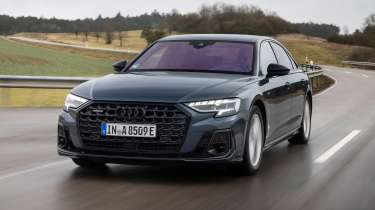
2. Audi A8 (32.92%)
The first of numerous luxury electric cars to make an appearance; the Audi A8 limousine takes a huge hit when it comes to depreciation. The plug-in hybrids are actually some of the better performers when it comes to depreciation, which should give you an idea of the overall picture. It’s not as sharp to drive as some of BMW's offerings, but that arguably makes it better to be chauffeured around in.
Read our full review of the Audi A8 to find out more.
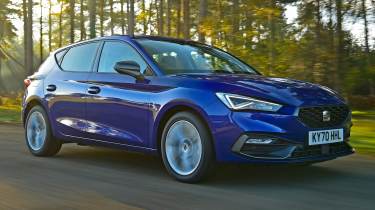
3. SEAT Leon e-Hybrid (33.1%)
The SEAT Leon e-Hybrid is a hatchback with broad appeal, the car is styled in a charming way and practical enough for everyday use. Even keen drivers won’t have much to complain about given that the Leon e-Hybrid is packed with plenty of power. Even though it is an attractive package, the SEAT badge does suffer in comparison to German rivals like the VW Golf and Mercedes A-Class contributing to fast depreciation.
Read our full review of the SEAT Leon e-Hybrid to find out more.
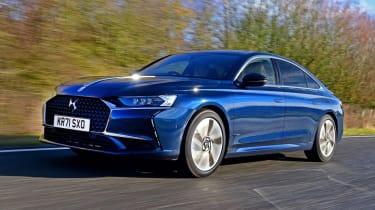
4. DS 9 E-Tense (33.49%)
Big French saloon cars have long struggled in the UK market, with buyers favouring established German rivals instead. It’s no wonder, then, that the latest DS 9 E-Tense finds itself near the top of our list of the fastest-depreciating hybrid cars. If you want one, we’d recommend that you buy one secondhand and you could bag yourself a comfortable, refined, tech-laden executive saloon for a fraction of what it would cost brand-new.
Read our full review of the DS 9 E-Tense to find out more.
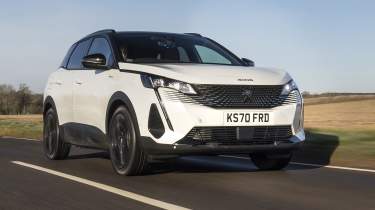
5. Peugeot 3008 (33.7%)
The Peugeot 3008 offers style as well as substance with its concept car-esque looks and big boot. What it doesn’t provide, however, is strong residuals, as the Peugeot 3008 will only retain 33.7% of its value over the stated three-year, 36,000-mile period.
Read our full review of the Peugeot 3008 to find out more.
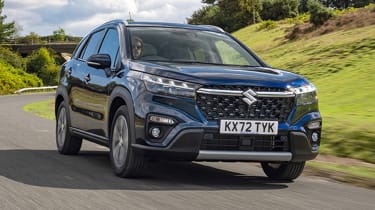
6. Suzuki S-Cross (34.82%)
The Suzuki S-Cross may be a budget-friendly way into a hybrid crossover, but with a severe lack of power and a dull, outdated interior, the Japanese brand’s SUV doesn’t fare too well when it comes to holding onto its value. Owners can expect the car to lose over 65% of its initial starting price over three years, which is behind rivals from Nissan and Hyundai.
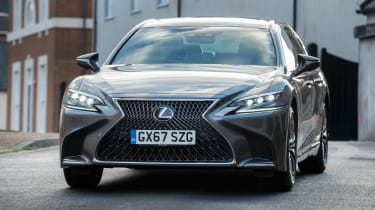
7. Lexus LS 500h (35.42%)
The Lexus LS 500h opts for a full-hybrid setup rather than being a plug-in. While that limits the opportunity for a longer zero-emissions range, it should still prove admirably efficient for such a large car. Big drops in value are inevitable at this end of the market – although it seems the LS is particularly prone – but that means there are bargains to be had second-hand.
Read our full review of the Lexus LS 500h to find out more.
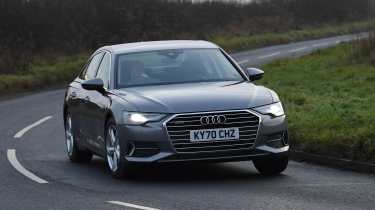
8. Audi A6 (35.52%)
The Audi A6 is another model showing that premium cars aren’t always going to hold their money. Despite being a very efficient and comfortable saloon, the A6 is expected to lose over 64 per cent of its value in three years - meaning a great opportunity for second hand buys, but a bitter pill to swallow for the new car customers.
Read our full review of the Audi A6 to find out more.
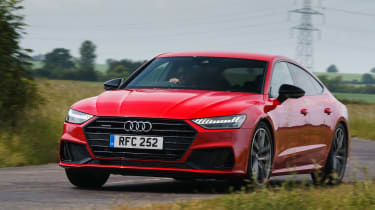
9. Audi A7 (35.53%)
The third Audi on this list is the A7. This car is good-looking, crammed full of technology and comes with the option of an efficient plug-in hybrid setup. However, it can’t escape the apparent fate of all high-end Audis: every variant of the A7 retains well below 50% of its initial value – and with such a high starting price, that’s a big drop.
Read our full review of the Audi A7 to find out more.
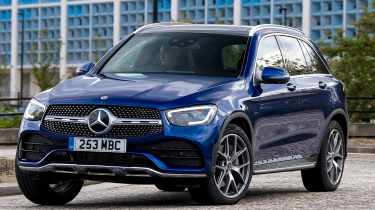
10. Mercedes-Benz GLC (36.91%)
Showing that Audis aren’t the only German hybrids that depreciate badly, the Mercedes GLC is another that is affected by big losses. The GLC is a hybrid that brings plenty of speed and power to the table, plus, unlike other hybrids you can still get a diesel variant. However, none of that prevents the strong depreciation which in this case, loses more than 63 per cent.
Read our full review of the Mercedes-Benz GLC to find out more.


